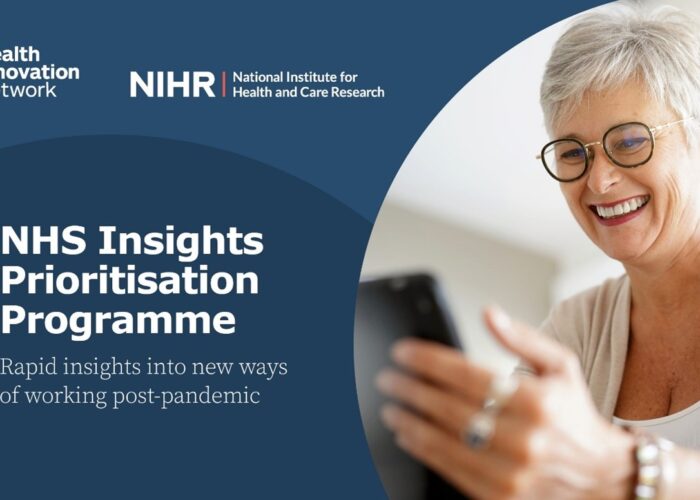The consortium partners (from l-r): Dr Nicholas Hicks (COBIC), Andrew P. Smith (COBIC), Dr Oliver Groene (Optimedis), Dr h.c. Helmut Hildebrandt (Optimedis), Dr Nick Goodwin (IFIC).
Katja Behrendt, ICHP Innovation Delivery Manager , introduces the new programme…..
Imperial College Health Partners has launched an Outcomes-Based Healthcare Commissioning Programme in partnership with Optimedis AG, COBIC, the International Foundation for Integrated Care (IFIC), UCLPartners and the North West London Collaboration of Clinical Commissioning Groups’ (CCGs) Change Academy.
Outcomes-based commissioning focuses on improving population health by incentivising sickness prevention and increasing the value of care delivery, rather than simply on the volume of services or demand management. To deliver such an approach, health systems need to be redesigned, building appropriate data systems to capture outcomes of relevance to patients, and offering the right incentives for providers to work towards a common goal – a system that promotes health, rather than responds solely to ill-health.
This partnership programme has been designed based on learning from OpiMedia, COBIC and IFIC. It also draws on work undertaken by Camden Clinical Commissioning Group, supported by UCLPartners, and builds on the work of Michael Porter and Thomas Lee. It seeks to guide participants to produce a proposal for their own outcomes-based project.
The first workshop took place on 19th September with attendees from Brent, Harrow, Essex, Hackney, and the Royal Marsden Hospital. We heard case studies from the founder of the international landmark model ´Healthy Kinzigtal´, Helmut Hildebrand, and the Chief Executive of COBIC, Dr Nicholas Hicks, as well as background on health commissioning in the UK and population needs analysis by IFIC’s Dr Nick Goodwin.
Over the course of the next 6 months, there will be five more interrelated workshops about evaluating population health needs, improving resource utilisation, defining outcomes, monitoring population health, designing the contract, and implementation of a value-based approach. The programme also includes an eLearning environment to build a community of practice.
Shirlene Oh, ICHP Director of Commerce, said: “We’re extremely proud to launch our new Outcomes-Based Healthcare Commissioning Programme. The programme aims to provide commissioners and providers from health and care with pragmatic, hands-on support as they develop their accountable care partnerships. We’re looking forward to working closely with our partners over the next five months.”
Charlotte Williams, UCLPartners Chief of Staff, said: “As an academic health science partnership UCLPartners has long held the view that addressing the health system’s challenges needs a focus on true value for patients. This must be in relation to the outcomes that matter most to patients divided by the cost of delivering those outcomes, not just on efficiency and cost reduction.”
“Along with Imperial College Health Partners and other partners across London and beyond, we’ve collaborated to share learning in value within healthcare. We’re pleased to support our participating partners in this programme, as it aims to articulate and develop the pivotal role commissioners have in influencing the delivery of high value health and care. It also supports innovation and makes use of best practice, which is increasingly relevant in today’s place-based systems agenda.”
The consortium delivering the workshops has extensive experience with outcomes-based commissioning, including the following:
- OptiMedis AG manages a group of regional Integrated Care Delivery Systems in Germany and the Netherlands, on being the 10-year experience of implementing value-based models in Germany (the international landmark model ´Healthy Kinzigtal´).
- COBIC works with commissioners in England to turn the idea of Capitated Outcomes-based and Incentivised Commissioning (COBIC) into practical reality.
- IFIC is a not-for-profit Foundation to advance the science, knowledge and adoption of integrated care policy and practice.
Initial feedback from the participants was that the instructors were well prepared and helpful and the real example from Kinzigtal very informative. Participants wanted more time for peer learning and group discussions, which will be taken on board for the next workshop, which will focus on improving resource utilisation.
Subsequent modules include the role of outcome measures in outcomes-based commissioning (and the pitfalls in designing and interpreting such measures); defining a performance dashboard for their commissioning unit; moving from outcomes that can be measured to a contract that can be used to incentivise change and implementing the value-based approach.
For further details and information about the programme, or if you are interested in taking part in the next cohort, please contact Shirlene.oh@imperialcollegehealthpartners.com.
Colleagues from UCLPartners can contact charlotte.williams@uclpartners.com for more information about the programme or to discuss how UCLPartners may be able to support you.



